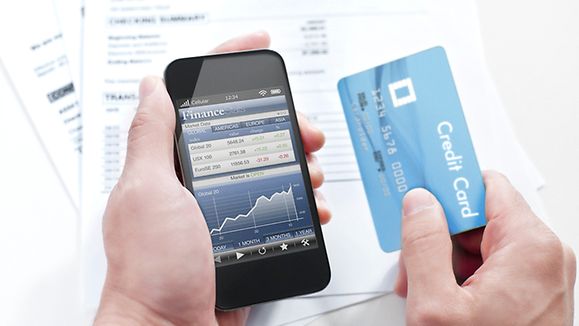Consumer Goods Industries
Digital Payment Usage Up as Germans Forego Cash in Corona Crisis
The Covid-19 crisis has accelerated the trend towards cashless payments. Almost half of Germans have changed their payment behaviors in response to the global pandemic.
From Josefine Dutschmann
Cash is king
Germans love their cash. European Central Bank research shows that Germans carry the most cash in comparison with citizens of other European Union countries. Not for nothing is there a German proverb: Nur Bares ist Wahres! (“Only cash is king!”). “Germans have a high affinity for cash” according to former Bundesbank board member Andreas Dombret. Germans started hoarding cash as the corona crisis reached Europe in March – the only comparable precedent being the global financial crisis of 2008. Savers withdrew in the region of EUR 10 billion from their bank accounts. This makes the Germans a lonely exception in Europe. While the savings deposits of Italian, French and Spanish citizens continued to grow in March, the opposite was palpably the case in Germany. However, experts presume that this is just a short-term trend – as was also evidently the case in 2008 – and that the funds will be redeposited in the not-so-distant future.
Cashless payments up
The large amounts of cash swirling around at home were not used to pay for products or services in cash. Instead, Germany – a society long dominated by cash payments – has seen a marked increase in cash-free payments in stationary retail since the start of the Covid-19 crisis in the country. Although major restrictions on movement have been put in place, the country has not been in a state of complete lockdown at any time: grocery stores, drug stores, pharmacies and – with the exception of a few regions – even DIY stores have remained open in order to provide the public with goods for their daily lives while maintaining strict hygiene rules.
Almost half of Germans changing payment behavior
And customers are changing their payment behavior. Forty-three percent of people have changed their payment behavior in recent weeks according to a Bundesbank survey. More and more Germans are opting for cashless and contactless payment at the point of sale. This development has been encouraged by a number of factors since the start of the crisis. On the one hand, there is the appeal to pay attention to what one touches, accompanied by greater caution in handling cash. Supermarkets, for example, are asking their customers to make cashless payments in order to limit the contact that their employees have with customers. The German banking industry has also increased the limit for contactless payment in the girocard system from EUR 25 to EUR 50. And many smaller shops, including bakeries and kiosks, where cash has long been the traditional method of payment, are also now offering cashless payment options.
Fintech companies supporting migration
Fintech companies have supported this rapid migration. Checkout provider Gastrofix, for example, has developed a digital support package – including card reader for contactless payment, digital menu with ordering function, and a customer database including voucher management – for restauranteurs to offer out-of-home business during the recent ban on restaurant opening.
"Non-cash, and in particular contactless payment, has increased considerably - in some cases solid double-digit figures - in those shops and markets that have opened, as it is also being promoted by operators in this difficult situation in most cases,"
says Horst Rüter, payment expert at the EHI Retail Institute. "This makes a lot of sense, especially for hygienic reasons." This is having an effect. A survey published by the EHI Institute in April finds that, prior to the pandemic, 38 percent still preferred cash payment – a figure that has dropped to just 18 percent since the start of the crisis. Forty-two percent prefer classic card payment, 31 percent contactless payment by card, and 8 percent mobile payment options.
Three growing trends
According to the payment experts at Oliver Wyman, the corona pandemic has significantly weakened German customer reluctance to pay by card, contactless methods and mobile wallets. But this is just part of the current development. The fall in cash payments is also being driven by the growing numbers of retailers allowing electronic payment. And last but not least, the introduction of Google Pay and Apple Pay has been another driver of contactless payment. As such, a number of trends are working in tandem to reinforce uptake.
The future of cash?
According to the Bundesbank, cash payment share of 2017 turnover was still 52 percent. Using a reference scenario, strategy consultancy payment experts conclude that the share of cash payments will fall by 20 percentage points to 32 percent by 2025. Should the trend intensify and customers continue with their current payment behaviors, cash use could fall to around just 20 percent of retail sales in the next five years.
European mobile payment system
One important driver here could be the swift establishment of a European mobile payment system. Bundesbank board member Burkhard Balz would like to see the swifter development of European payment system for mobile phones. Speaking in May, he commented that “it sometimes seems to me, that some people are only just waking up now." Nevertheless, Balz remains confident, noting the importance of European system sovereignty in many systematically relevant areas traditionally dominated by Chinese and US suppliers.
Cashless and contactless market set to grow
The Covid-19 crisis has significantly accelerated the trend towards cashless payments. According to bitkom, Germany`s digital association, more than 70 percent of Germans would like to see more digital and contactless payment options. The association has been campaigning for a long time to ensure that at least one electronic payment method – ideally contactless - is offered at every point of sale. The market for cashless and contactless payment solutions will continue to grow in Germany, providing new opportunities for international service providers.


